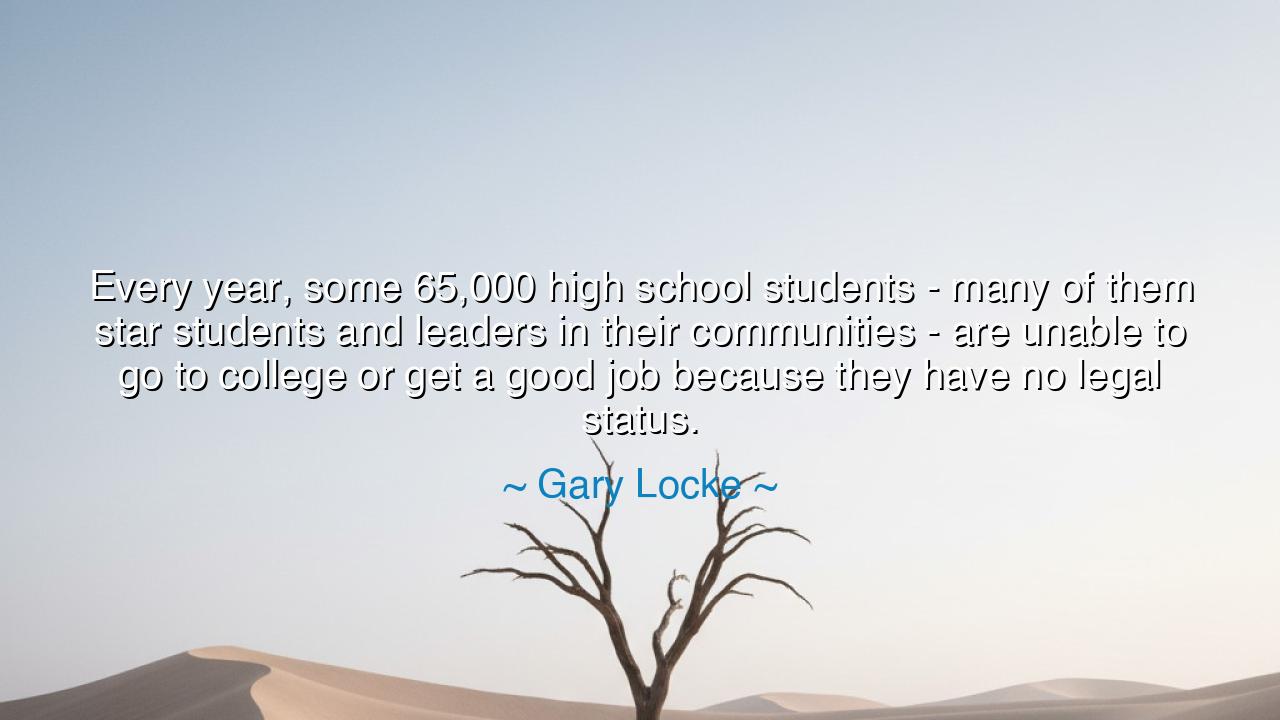
Every year, some 65,000 high school students - many of them star
Every year, some 65,000 high school students - many of them star students and leaders in their communities - are unable to go to college or get a good job because they have no legal status.






When Gary Locke said, “Every year, some 65,000 high school students — many of them star students and leaders in their communities — are unable to go to college or get a good job because they have no legal status,” he was not merely reciting statistics. He was sounding a lament for wasted potential, for dreams confined not by lack of merit, but by circumstance. In those few words lies a tragedy both quiet and immense — a tragedy of youth caught between two worlds, of children who have grown under one nation’s sky yet find themselves unrecognized by its laws. It is a cry for justice, not just for individuals, but for the soul of a nation that forgets to see the humanity behind its borders.
This quote springs from the context of America’s immigration struggles, where thousands of young people — often brought to the country as infants — grow up pledging allegiance to a flag that does not yet claim them. They excel in their studies, lead in their communities, and embody the very spirit of the nation’s promise — yet when they reach the gates of adulthood, those gates remain closed. The absence of legal status becomes a chain around their ankles, holding them back from education, opportunity, and belonging. Locke, himself a descendant of immigrants, saw in these young hearts a reflection of the nation’s own beginnings — the struggle to find a place in the world through effort, virtue, and hope.
Throughout history, the plight of the unrecognized and the excluded has tested the conscience of civilizations. In ancient Athens, the children of foreign-born parents were denied citizenship, no matter how deeply they contributed to the city’s life. Many of these young souls fought in wars, taught in schools, built homes — yet remained invisible in the eyes of the law. And so too today, Locke’s words echo the same injustice: that law without compassion can turn promise into punishment. For a society’s greatness is not measured by whom it includes in privilege, but by whom it chooses to lift from invisibility.
To understand the full weight of Locke’s observation, one must look to real lives, not numbers. Consider the story of Diane Guerrero, the American actress whose parents were deported when she was only fourteen. Though born in the United States, she grew up surrounded by friends who feared deportation daily — bright students who dared not apply to college or drive to work. Their talents, their ambitions, their very American-ness, were left untapped. Each year, as Locke says, tens of thousands like them graduate, not into the world of freedom, but into the shadow of exclusion. They are living proof that a person can belong in every sense — except on paper.
Yet within this sorrow lies a profound challenge to the rest of us. Locke’s words are a mirror reflecting not only policy, but the moral state of a people. When we deny opportunity to those who have earned it, we wound our own spirit. When we turn away from potential because of birthplace, we turn away from our own humanity. For the law, though sacred, must serve justice — and justice without mercy becomes tyranny in disguise. The young without legal status are not strangers; they are our students, our neighbors, our future leaders, waiting for a nation to see them.
Locke’s message is thus both political and eternal. It calls for laws that recognize merit over circumstance, compassion over fear. It reminds us that behind every statistic stands a human being — one who has studied late into the night, cared for family, dreamed of serving a country that has yet to embrace them. To open the path of education and employment for these youths is not charity — it is restoration, the act of returning to them what their work and spirit have already earned.
Let the lesson be this: A nation’s greatness is measured not by the walls it builds, but by the doors it opens. When we give the young a chance to rise, we rise with them. When we free the captive potential in others, we renew our own civilization. Locke’s voice, calm yet piercing, calls us to remember that law must evolve with wisdom, and that justice must breathe with compassion. For every child denied a future is a star dimmed in the firmament of human progress — and to let such stars fade is to lose a little of our own light.






AAdministratorAdministrator
Welcome, honored guests. Please leave a comment, we will respond soon